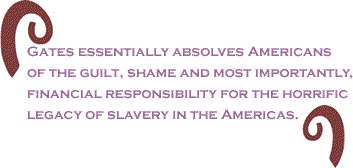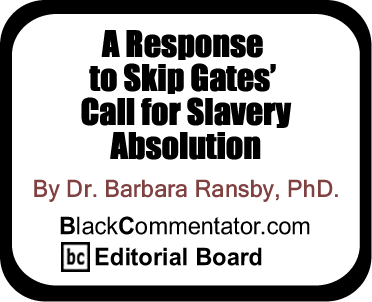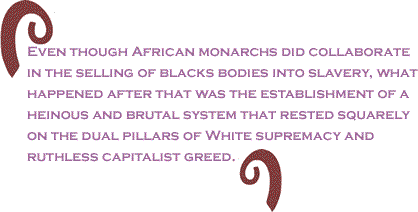
|
||||||||||||||||||||||
|
||
 |
||
In a recent New York Times editorial, entitled, ´┐ŻEnding the Slavery Blame-Game,´┐Ż (April 23) Harvard Professor Henry Louis Gates calls on the United States´┐Ż first Black president to end the nation´┐Żs sense of responsibility for the legacy of slavery. It is a pernicious argument, well suited to the so-called ´┐Żpostracial´┐Ż moment we are in. Like the erroneous claims of ´┐Żpost-racialism,´┐Ż in general, Gates´┐Ż editorial compromises rather than advances the prospects for racial justice; and clouds rather than clarifies the history, and persistent realities, of racism in America. Gates essentially absolves Americans of the guilt, shame and most importantly, financial responsibility for the horrific legacy of slavery in the Americas. How does he do this? -- Through a contrived narrative that indicts African elites. And they did collaborate in the trade. But this is no news flash. Every history graduate student covering the Atlantic World knows that people of African descent (like the elites from every other corner of the globe) waged war against one another, captured enemies in battle, and enslaved their weaker and more vulnerable neighbors. This is nothing unique to Africa. What is problematic about Gates´┐Ż essay is how he frames and skews this fact. The frame is this. Black and White people in the United States should now ´┐Żget over´┐Ż slavery because as we all know, this was not a racial thing but an economic thing. Since both Blacks and Whites were culpable, the call for reparations is indeed meaningless and bereft of any moral weight. If we take Gates´┐Ż argument to its full conclusion, we might claim that it is not America or Europe, but the long suffering, impoverished, and debt-ridden nations of Africa, that should really pay reparations to Black Americans. ´┐ŻThe problem with reparations,´┐Ż Gates proclaims, is ´┐Żfrom whom they would be extracted.´┐Ż This is a dilemma since Africans were neither ´┐Żignorant or innocent,´┐Ż when it came to the slave trade. At its worse, Gates´┐Ż argument resembles that of some Holocaust deniers who don´┐Żt deny that ´┐Żbad things´┐Ż happened to the Jews, but add that maybe the Nazi´┐Żs weren´┐Żt the only ones to blame. Maybe the Jews, in part, did it to themselves. Stories that over-emphasize the role of the Judenrats (Jewish Councils), for example, who were coerced into providing slave labor to the Nazis and organized Jews to be sent to the concentration camps, distorts the real culprits and criminals of the Holocaust, and in the final analysis, serves to blame the victims. Even though African monarchs did collaborate in the selling of blacks bodies into slavery, what happened after that was the establishment of a heinous and brutal system that rested squarely on the dual pillars of White supremacy and ruthless capitalist greed. There was nothing African-inspired about it.
It is with the construction of a racialized slave regime in the Americas that a new form of the ancient institution of slavery was honed and refashioned. African slaves in the Americas, unlike most other places, were deemed slaves for life, and their offspring were enslaved. Moreover, Black servants were distinguished from white servants (who were also badly treated) and stripped of all rights and recourse. As slavery evolved even ´┐Żfree´┐Ż Blacks were denied basic rights by virtue of sharing ancestry and phenotype with the enslaved population. Racism, as so many scholars have documented was the critical and ideological justification for the exploitation, or more accurately, theft, of black labor for some 300 years. Blacks were deemed inferior, childlike, savage, and better suited to toiling in the hot sun than Whites, and innately incapable of governing themselves. These are the racist myths and narratives that justified slavery in the Americas. It was indeed different in this way from other slave systems where the fabricated mythologies of race did not rule the day. Another problem with Gates narrative about slavery is that he neglects to examine the plantation experience itself as the main ground on which African and African-American labor was exploited. As distinguished historian, Eric Foner, points out in his letter to the Times on April 25, in critical response to Gates, the internal U.S. slave trade, which had nothing to do with Africa or African elites, involved the buying and selling of over two million Black men, women and children between 1820 and 1860. Slavery existed for over a half century after the abolition of the trans-Atlantic trade in 1807. Even if African monarchs were complicit in and benefited individually from the trade, none of them received dividends from the profits generated by the production of millions of tons of tobacco, sugar and cotton by the stolen labor of imprisoned African and African-American plantation workers (i.e. slaves). It is this appropriation of millions of hours of uncompensated labor that is the core of the reparations demand. Professor Gates´┐Ż selective storytelling and slanted use of history paints a very different picture than does the collective scholarship of hundreds of historians over the last fifty years or so. A learned man who commands enormous resources and unparalleled media attention, why would Gates put this argument forward so vehemently now? It is untimely at best. At a time when ill-informed and self-congratulatory commentaries about how far America has come on the race question, abound, Gates weighs in to say, we can also stop ´┐Żblaming´┐Ż ourselves (´┐Żourselves´┐Ż meaning white Americas or their surrogates) for slavery. The burden of race is made a little bit lighter by Gates´┐Ż revisionist history. It is curious that the essay appears at the same time that we not only see efforts to minimize the importance of race or racism, but at a moment when there is a rather sinister attempt to rewrite the antebellum era as the good old days of southern history. Virginia Governor Bob McConnell went so far as to designate a month in honor of the pro-slavery Confederacy. Gates´┐Ż essay fits conveniently into the new discourse on post-racialism. Slavery was long ago, the story goes, and Black Americans have come such a long way. So, we need to stop embracing ´┐Żvictimhood,´┐Ż get over it and move on. We need to stop complaining and ´┐Żend the blame game,´┐Ż with regards to racism. After all, doesn´┐Żt the election of Barack Obama relegate racism to the dustbins of history? Gates goes even further to suggest that even the worst marker of American racism, slavery, wasn´┐Żt so exclusively racial after all.
Clearly, there has been racial progress in the United States since the Civil War and the Civil Rights Movement. That progress was born of decades of struggle and protest. But we have not come as far as some would have us believe. And we don´┐Żt escape history by either tracing common ancestry or blaming others for comparable crimes. Reconciliation with the past is a long, arduous and complex process and there are no shortcuts. Moreover, ´┐Żthe past´┐Ż is not so long ago. In other words, chattel slavery ended in the United States in the 1860s but, as Herb Boyd, in yet another letter to the New York Times in response to Gates, rightly points out, ´┐Żthe economic disadvantage of Black workers extended beyond the long night of slavery into the iniquitous era of Jim Crow´┐Ż (marked by segregation, legal disenfranchisement, and rampant violence). Moreover, we don´┐Żt have to go back to Jim Crow to see the ravages of American racism, a racism that took hold under slavery. Today, millions of young Black men and women are caged, shackled and dehumanized by a prison system that is growing rapidly, privatizing and increasingly exploiting the labor of its inmates. That scenario is far from Harvard Square, where police harassment lands you in the White House and on television. But the reality of the 21st century carceral state suggests that various forms of coercion and containment are palpably present today. It is not slavery but a powerful reminder of it. And once again people of color are disproportionately impacted.
BlackCommentator.com Editorial Board member Barbara Ransby, PhD is a historian, writer and longtime activist. She is Professor of African American Studies, History and Gender and Women's Studies at University of Illinois at Chicago where she also directs the Gender and Women's Studies Program. Dr. Ransby serves on the editorial board of "Race and Class´┐Ż and is also the author of the award-winning biography, "Ella Baker and the Black Freedom Movement: A Radical Democratic Vision (Gender and American Culture)". Click here to contact Dr. Ransby. |
||
If you would like to comment on this article, please do so below. There is a 400 character limit. You do not need a FaceBook account. Your comment will be posted here on BC instantly. Thanks. Entering your email address is not mandatory. You may also choose to enter only your first name and your location.
|
||
Thank you very much for your readership. |
||
| Any BlackCommentator.com article may be re-printed so long as it is re-printed in its entirety and full credit given to the author and www.BlackCommentator.com. If the re-print is on the Internet we additionally request a link back to the original piece on our Website. | ||
| |
||
April 29, 2010 |
| Executive Editor: David A. Love, JD |
| Managing Editor: Nancy Littlefield |
| Publisher: Peter Gamble |
| Est. April 5, 2002 |
| Printer Friendly Version in resizeable plain text format |
 |
 |
 |

|
 |
| |
| |
















































